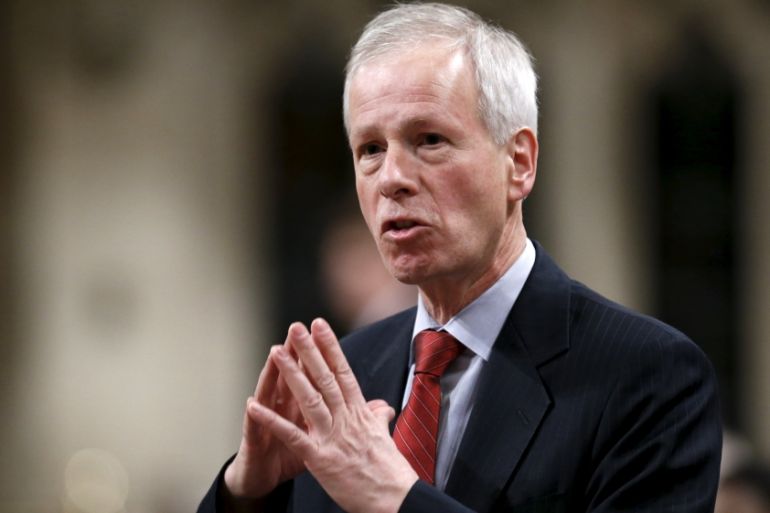Canada and Iran ease into a new friendship
As Ottawa prepares to lift sanctions against Tehran, analysts say political barriers may slow return of diplomatic ties.

Toronto, Canada – Canada’s new government has said it will lift some United Nations-imposed sanctions against Iran, but experts and activists say further changes in relations with Tehran face legal and political barriers.
Speaking in parliament in Ottawa, Stephane Dion, the foreign affairs minister, said on Tuesday that Canada was prepared to lift sanctions imposed in response to UN Security Council resolutions on Iran’s nuclear programme.
Keep reading
list of 4 itemsBehind India’s Manipur conflict: A tale of drugs, armed groups and politics
China’s economy beats expectations, growing 5.3 percent in first quarter
Inside the pressures facing Quebec’s billion-dollar maple syrup industry
The UN announced last week that Tehran was complying with the terms of a multilateral deal curbing its nuclear programme and that member states were free to lift sanctions.
Canada will join the United States, the United Kingdom and others in easing restrictions on business and trade with Iran.
|
|
But there are other, more sweeping sanctions imposed for different reasons, some by the previous government, led by Conservative former prime minister Stephen Harper.
Harper’s administration cut diplomatic ties with Tehran in 2012 and listed Iran as a state sponsor of terrorism.
Canadian Prime Minister Justin Trudeau promised to reopen state-to-state relations with Tehran during his successful election campaign last year.
According to Thomas Juneau, a University of Ottawa professor, Iran expert and former official at Canada’s Department of National Defence, legislation introduced by the Harper government amounted to “booby-traps” that could trip up the new government’s plans.
That is a problem, he said, as European countries and even the US are looking at how the nuclear deal allows them to resume doing business with Iran in a number of potentially lucrative areas, from aviation to oil.
“These laws make it more difficult for Canada to follow suit, and that is worrisome because we are [already] out of sync with our partners,” Juneau said.
There are two separate challenges for Ottawa in restoring ties with Iran, Juneau believes; one is political, the other legal.
FROM THE ARCHIVES: Who will pay as Canada cuts ties with Iran?
Designating a country a state sponsor of terrorism is not something that can simply be undone; it may even require new legislation.
“For example, Iran is still close to Hamas and Hezbollah, both groups that Canada lists as having links to terrorism,” Juneau said.
“Those ties will remain a problem for us, whatever happens with Iran.”
A political strategy involves explaining Canada’s position, justifying it to the public and interest groups and creating consensus around the perceived need to restore diplomatic and business links.
“We need to look at how to prepare the ground [for better ties], because we are falling behind on many fronts, even while remaining cautious,” he said.
|
|
Analyst Navid Hassibi, from the Ottawa-based Council on International Policy, agrees.
“All our G7 partners are re-engaging and we are not,” he said. “Britain has restored diplomatic relations. Italy is already signing deals. We should be moving quickly.”
Improving human rights in Iran is part of this agenda, Hassibi added.
“We can’t talk to Iran about human rights if we’re not on speaking terms,” he said. “If we can be friends with Saudi Arabia, with whom we do business and have these issues, why not Iran?”
The recent prisoner exchange with Washington that saw Washington Post reporter Jason Rezaian and others being freed in exchange for Iranians held in the US showed what was possible, he said.
Two Iranians with Canadian permanent resident status – Saeed Malekpour and Mostafa Azaia – are currently serving time in Iranian jails.
But some in Canada’s Iranian diaspora vigorously oppose moves towards normal relations.
Samira Mohyeddin, a Toronto restaurant-owner and activist, cites the case of Zahra Kazemi, an Iranian-Canadian photo-journalist who was arrested, tortured and killed while in custody in Tehran in 2003.
That case has never been settled, and Mohyeddin says its perpetrators are still powerful at senior levels in the Iranian regime.
“This is a vicious theocracy,” she said. “It’s not all about money, it’s also about basic human rights which are denied in Iran.

“If they reopen an embassy in Ottawa, we will be protesting in front of it, just as we did for 30 years before 2012.”
Canada’s Conservative opposition agrees.
Peter Kent, the party’s foreign affairs critic, said Canadian diplomats might face real risks if they returned to Iran.
There is no doubt that the current government is aware of both the pitfalls and the opportunities in pursuing changes in ties with Tehran.
As Foreign Minister Dion said on Tuesday: “Canada will lift its sanctions but what Canada will maintain is our suspicion of [the] regime. We will take this step by step.”